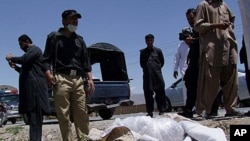The International Committee of the Red Cross says it has stopped most of its relief operations in Pakistan following the brutal murder of one of its workers. These types of killings are making it increasingly difficult for foreign aid groups to operate in the country.
The decision by the International Committee of the Red Cross to suspend operations in three of Pakistan's four provinces is expected to affect thousands of people who depend on the aid.
ICRC spokeswoman Anastasia Isyuk tells VOA the move is in response to the murder of 60-year-old Khalil Dale, who worked for the organization in Baluchistan province.
"Due to this recent attack against the ICRC, we decided to completely reassess the balance between the humanitarian impact of our activities and the risks that our staff face," said Isyuk.
Authorities recovered the mutilated body of the British aid worker on April 29, four months after suspected militants abducted him on his way home from work in the city of Quetta. A note with the body said Dale died because the Red Cross failed to pay ransom for his return.
The ICRC suspended its work in Baluchistan immediately after the discovery of Dale's body. On Thursday, the organization extended the suspension to the northwestern city of Peshawar and Pakistan's most populous city, Karachi, and said it was unclear when work would resume.
Steve Claborne is with the Pakistan Humanitarian Forum, an umbrella organization that helps coordinate efforts among 48 aid agencies.
"In the last several years, the numbers of those who were either killed or kidnapped has increased," said Claborne. "And just in this year, we've had kind of a rash of kidnappings across the country, which is a new phenomenon. And it also is affecting national organizations, national non-profit humanitarian organizations, as well."
According to PHF estimates, at least 18 aid workers have been murdered and more than 20 others abducted in Pakistan since 2009. And Claborne says these are just the cases that make headlines. He says abduction for ransom has become a big business in Pakistan.
Claborne, who also is the country director for the non-profit group Mercy Corps, says suspending operations is the correct response after an organization is targeted. But he recommends taking certain steps from the beginning to help limit the risk of any sort of attack.
"If you have the time or ability to work with local leaders and local communities, to explain your program, to be transparent in what you do, to be completely above board in your transactions, then 99 percent of the time there will be humanitarian space," he said.
Unfortunately, Claborne says the writ of the government is severely limited in many of the areas aid groups operate, making it very difficult to have those conversations. And with no arrests in any of the recent abduction cases, he says much more work remains to be done.
The decision by the International Committee of the Red Cross to suspend operations in three of Pakistan's four provinces is expected to affect thousands of people who depend on the aid.
ICRC spokeswoman Anastasia Isyuk tells VOA the move is in response to the murder of 60-year-old Khalil Dale, who worked for the organization in Baluchistan province.
"Due to this recent attack against the ICRC, we decided to completely reassess the balance between the humanitarian impact of our activities and the risks that our staff face," said Isyuk.
Authorities recovered the mutilated body of the British aid worker on April 29, four months after suspected militants abducted him on his way home from work in the city of Quetta. A note with the body said Dale died because the Red Cross failed to pay ransom for his return.
The ICRC suspended its work in Baluchistan immediately after the discovery of Dale's body. On Thursday, the organization extended the suspension to the northwestern city of Peshawar and Pakistan's most populous city, Karachi, and said it was unclear when work would resume.
Steve Claborne is with the Pakistan Humanitarian Forum, an umbrella organization that helps coordinate efforts among 48 aid agencies.
"In the last several years, the numbers of those who were either killed or kidnapped has increased," said Claborne. "And just in this year, we've had kind of a rash of kidnappings across the country, which is a new phenomenon. And it also is affecting national organizations, national non-profit humanitarian organizations, as well."
According to PHF estimates, at least 18 aid workers have been murdered and more than 20 others abducted in Pakistan since 2009. And Claborne says these are just the cases that make headlines. He says abduction for ransom has become a big business in Pakistan.
Claborne, who also is the country director for the non-profit group Mercy Corps, says suspending operations is the correct response after an organization is targeted. But he recommends taking certain steps from the beginning to help limit the risk of any sort of attack.
"If you have the time or ability to work with local leaders and local communities, to explain your program, to be transparent in what you do, to be completely above board in your transactions, then 99 percent of the time there will be humanitarian space," he said.
Unfortunately, Claborne says the writ of the government is severely limited in many of the areas aid groups operate, making it very difficult to have those conversations. And with no arrests in any of the recent abduction cases, he says much more work remains to be done.









